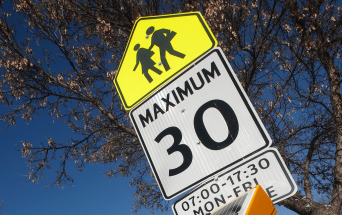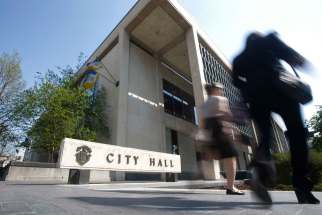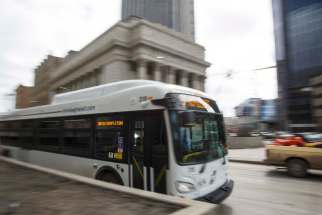City unveils proposed newcomer welcoming policy
Read this article for free:
or
Already have an account? Log in here »
To continue reading, please subscribe:
Monthly Digital Subscription
$0 for the first 4 weeks*
- Enjoy unlimited reading on winnipegfreepress.com
- Read the E-Edition, our digital replica newspaper
- Access News Break, our award-winning app
- Play interactive puzzles
*No charge for 4 weeks then price increases to the regular rate of $19.00 plus GST every four weeks. Offer available to new and qualified returning subscribers only. Cancel any time.
Monthly Digital Subscription
$4.75/week*
- Enjoy unlimited reading on winnipegfreepress.com
- Read the E-Edition, our digital replica newspaper
- Access News Break, our award-winning app
- Play interactive puzzles
*Billed as $19 plus GST every four weeks. Cancel any time.
To continue reading, please subscribe:
Add Free Press access to your Brandon Sun subscription for only an additional
$1 for the first 4 weeks*
*Your next subscription payment will increase by $1.00 and you will be charged $16.99 plus GST for four weeks. After four weeks, your payment will increase to $23.99 plus GST every four weeks.
Read unlimited articles for free today:
or
Already have an account? Log in here »
Hey there, time traveller!
This article was published 11/02/2020 (2127 days ago), so information in it may no longer be current.
A new policy aimed at welcoming newcomers and turning Winnipeg into "a city without racism" recommends city hall create a "welcome pass," giving new residents affordable access to municipal services during their first year in Canada, and developing a diversity hiring program with a focus on youth employment.
Those are just some among dozens of ideas — more than half of which don’t yet have any funding attached — included in the proposed newcomer welcome and inclusion policy, released Tuesday and set to be discussed at next week’s executive policy committee meeting. (Any proposals would have to be later adopted by city council before implementation.)
"The City (of Winnipeg) will be an advocate and ally to newcomer residents, and will work to ensure that all newcomers are made to feel welcome, safe, equal and included, and at home in their new communities and city," the policy states.“The City (of Winnipeg) will be an advocate and ally to newcomer residents, and will work to ensure that all newcomers are made to feel welcome, safe, equal and included, and at home in their new communities and city.”
Documents tabled Tuesday in support use 2016 census data to show about a quarter of Winnipeggers (26 per cent) are immigrants, with the majority of them arriving in Canada as recent graduates, skilled workers, businesspeople, and family members. Immigration is expected to be a main driver of Winnipeg’s population increases in the coming years.
Part of Winnipeg’s newcomer-welcoming strategy would mean training the public service "on anti-oppression, including anti-racism and cross-cultural competency," according to the policy. It aims to encourage newcomers to use city services and make it easier to do so, as well as build a more representative workforce.
With that goal in mind, the city is tracking diversity within its own ranks.
Its first diversity report to be presented to councillors estimates the proportions of women, Indigenous people, visible minorities and people with disabilities working for the city will increase.

!function(e,i,n,s){var t=”InfogramEmbeds”,d=e.getElementsByTagName(“script”)[0];if(window[t]&&window[t].initialized)window[t].process&&window[t].process();else if(!e.getElementById(n)){var o=e.createElement(“script”);o.async=1,o.id=n,o.src=”https://e.infogram.com/js/dist/embed-loader-min.js”,d.parentNode.insertBefore(o,d)}}(document,0,”infogram-async”);
As of the end of 2018, women represented roughly 30 per cent of the civic workforce; employees who self-identified as visible minorities accounted for slightly less than 15 per cent; while Indigenous people accounted for roughly 10 per cent. Only about three per cent of the city’s workforce was made up of people with disabilities.
The diversity reports, which include each group’s median salaries, are now set to be completed annually.
Coun. Devi Sharma (Old Kildonan) pushed for the release of the workplace diversity data. Last summer, she put forth a motion, along with Mayor Brian Bowman, calling for the creation of a diversity report.
In an email Tuesday, Sharma said she’s pleased the first such report has been released, and that it will be an annual requirement.
"It gives us a snapshot of where we are at, and the work that needs to occur to ensure the City of Winnipeg workforce is reflective of our population," Sharma wrote. "It is important to have this data to see where we are currently and to track the progress year-to-year.
"The next step is to decide where we want to focus our efforts and develop a diversity and inclusion plan to reach those goals."
katie.may@freepress.mb.ca
Twitter: @thatkatiemay
wfppdf:https://wfpquantum.s3.amazonaws.com/pdf/2020/97793_PolicyFramework.pdf|Policy framework:wfppdf
Katie May is a general-assignment reporter for the Free Press.
Our newsroom depends on a growing audience of readers to power our journalism. If you are not a paid reader, please consider becoming a subscriber.
Our newsroom depends on its audience of readers to power our journalism. Thank you for your support.








